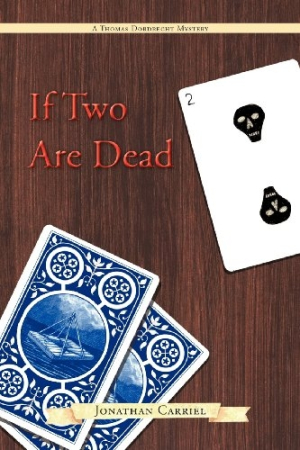If Two Are Dead
“I was in Ambercromby’s army at Ticonderoga,” quips Thomas Dordrecht, hero of Jonathan Carriel’s historical mystery. “I can stomach a corpse.”
That is fortunate for the young apprentice because corpses abound in 1762 New York, or at least they do in If Two Are Dead, the third in Carriel’s series built around a plucky English colonial of Dutch parentage. Dordrecht is a clerk in a shipping firm, not a detective or amateur sleuth—one of the author’s many choices that makes his book a refreshing read. Carriel infuses his story with just enough period detail to make it feel authentic; while there are tankards of ale and bosomy tavern wenches aplenty, Carriel doesn’t bombard the reader with useless trivia.
The author is an experienced recreational sailor, so when his hero journeys upon the waves, Carriel knows how to make his readers feel as if they are right there with Dordrecht. From the officer’s bunks that “resembled nothing so much as coffins” to the unsavory “burgoo” (an porridge-like stew) set before him, everything Dordrecht sees, touches, tastes, smells, and experiences aboard ship rings true. While the long section about the clerk’s time at sea and in the Caribbean does seem more an excuse for Carriel to talk about what he loves best rather than what is necessary to advance the story, it is still an entertaining and informative escape from the bleak winter of a city at war (that conflict being the Seven Year’s War, known in the Americas as the French and Indian War).
Carriel populates his novel with an amusing mix of characters and caricatures, from the staid Quaker who plays cards as long as the bet is limited to no more than a penny a hand to the requisite prostitute with a heart of gold. There are rakish scoundrels and rotten ruffians, corrupt officials and officious clerks, dithering matrons and doddering old Dutchmen, and more than a few historical figures and references thrown in for good measure. Even the title comes from Benjamin Franklin, who once cautioned that “three may keep a secret, if two of them are dead.”
Carriel is not the most exciting of storytellers, but he does spin a solid tale. The plot is straightforward, there are not too many surprises, and nothing seems out of place or implausible. The writing is clean, clever, and colorful, and the reader will easily sail through it without getting lost in any doldrums.
Like similar books in the murder-mystery genre that have historical characters and settings, the murder around which the plot is centered is not really what the book is about. If Two Are Dead is perhaps less about who killed whom than it is about daily life in Colonial America and one man’s transition from unwavering subject of the crown to independent-minded citizen. Anyone who reads If Two Are Dead will likely pick up the first two volumes in Carriel’s series—Die Fasting and Great Mischief—which will help ease the anticipation for the promised fourth book, Exquisite Folly.
Reviewed by
Mark McLaughlin
Disclosure: This article is not an endorsement, but a review. The publisher of this book provided free copies of the book and paid a small fee to have their book reviewed by a professional reviewer. Foreword Reviews and Clarion Reviews make no guarantee that the publisher will receive a positive review. Foreword Magazine, Inc. is disclosing this in accordance with the Federal Trade Commission’s 16 CFR, Part 255.

